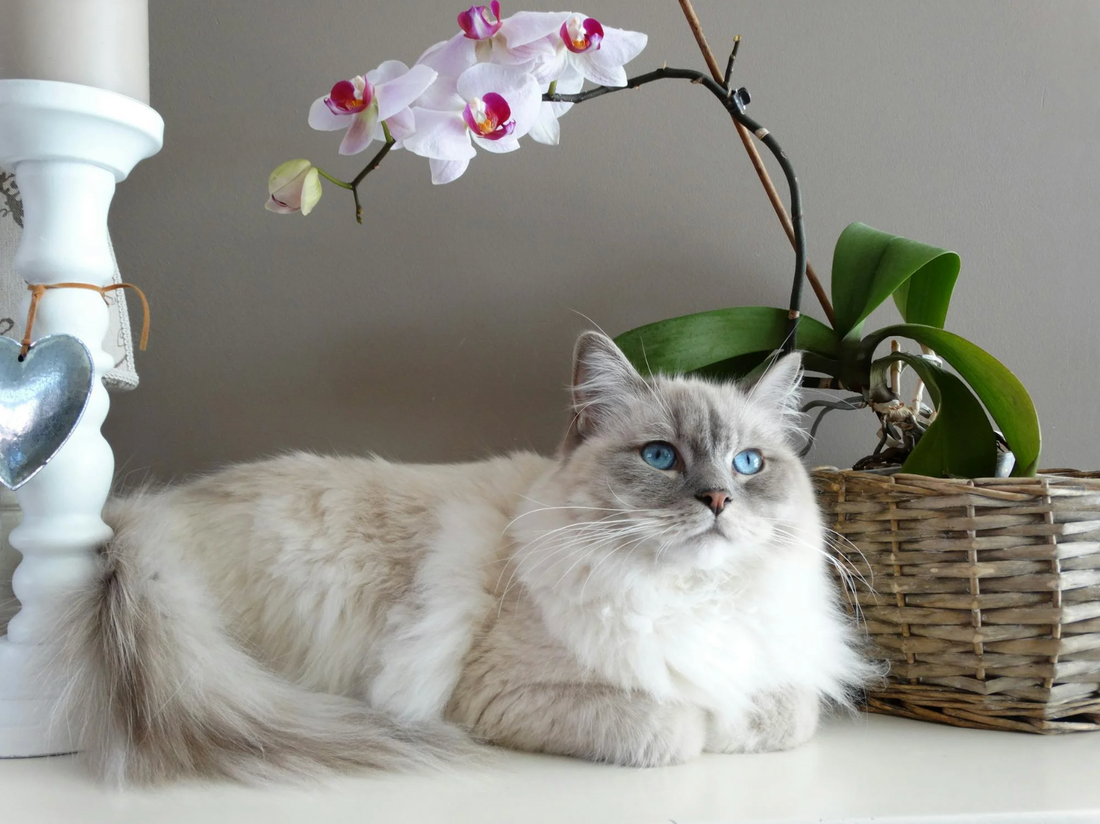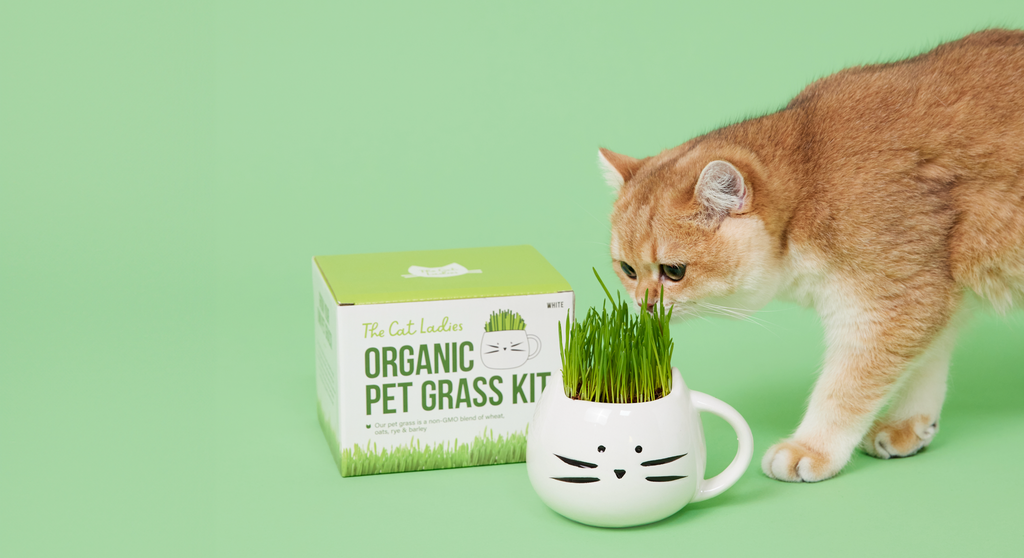
Are Orchids Poisonous to Cats? Facts and Tips for Cat Owners
Share
Are orchids poisonous to cats? The good news is that most orchids, including common types like Phalaenopsis, are not toxic to cats. However, some orchid species could cause mild stomach upset if ingested. In this article, we’ll explore which orchids are safe, what symptoms to watch for, and how to prevent your cat from nibbling on them.
Key Takeaways
- Most orchid species, including Phalaenopsis, are safe for cats, though some, like the Lady Slipper Orchid, can be harmful.
- Monitor your cat for mild gastrointestinal symptoms if they ingest orchids, and consult a veterinarian if symptoms persist or worsen.
- To prevent cats from munching on orchids, place them out of reach or use deterrents, and provide safe alternatives like cat grass.
Are Orchids Toxic to Cats?
Fortunately, most orchid species are safe for cats. This includes the popular Phalaenopsis, also known as the moth orchid. This means that if your cat takes a curious nibble, serious toxicity is unlikely. Understanding the potential minor effects and taking precautions can help keep your pets safe.
Orchids are typically considered safe for consumption. In some cases, consumption may lead to mild gastrointestinal upset. Cats that chew on orchids may experience symptoms like vomiting or stomach pain. These symptoms are usually not severe and should resolve within a day, but it’s always wise to monitor your cat closely. If you notice persistent vomiting or other unusual signs, it may be best to consult your veterinarian.
Some cats are naturally drawn to orchids because of their taste, fragrance, or the movement of their petals. To minimize the risk of your cat eating orchids, consider providing alternative plants that are safe for them to chew on, such as cat grass.
Identifying Safe and Unsafe Orchids
Not all orchids are created equal when it comes to pet safety. While most orchids are non-toxic, there are exceptions. For instance, the Lady Slipper Orchid (Cypripedium) can be harmful to cats. Although the level of toxicity might not be high, it’s still important to be cautious with this species.
On the flip side, many other orchid species like the Oncidium, Dendrobium, and Phalaenopsis are considered safe for cats. These species are commonly found in homes and pose little to no risk if ingested. As with any plant, observing your cat’s behavior and any potential reactions is wise.
Pet owners interested in keeping orchids should research potential risks before bringing a new plant home. Identifying safe orchids and avoiding harmful ones ensures a safer environment for your feline friends.
Symptoms of Orchid Ingestion in Cats
Watch for signs of gastrointestinal upset if your cat has been munching on your orchids. Common symptoms include vomiting, diarrhea, and loss of appetite. These symptoms can occur if a cat ingests any part of the orchid, but they are usually mild and temporary.
Monitor your cat closely after they have eaten an orchid. While most cases of orchid ingestion result in only mild discomfort, knowing what to look for can help you respond quickly if symptoms worsen. Ingesting large amounts of orchid material can lead to more severe gastrointestinal issues, so vigilance is paramount.
Providing supportive care at home is often sufficient if you notice any of these symptoms. Ensure your cat stays hydrated and comfortable while their stomach settles. If symptoms persist or worsen, it’s time to seek advice from your veterinarian.
What to Do If Your Cat Eats an Orchid

If your cat couldn’t resist the allure of your orchid and took a bite, What should you do next? Monitor your cat for signs of stomach upset, such as vomiting or diarrhea. These symptoms typically resolve within a day, but keeping a close watch on your pet is important.
If your cat shows severe reactions such as seizures or breathing difficulties, immediate veterinary care is essential. Such severe reactions are rare but highlight the need for preparedness. Contact your vet if persistent vomiting or diarrhea develops. When visiting the veterinarian, bring the orchid plant or its label for reference. This can help the vet identify the specific type of orchid and provide the best possible care for your cat.
In most cases, mild symptoms can be managed at home by providing your cat with plenty of water and a quiet, comfortable space to rest. However, never hesitate to seek professional advice if you’re concerned about your cat’s health.
The Importance of Cat Grass
Indoor cats often seek out plants to chew on to satisfy their natural instincts. Providing cat grass can be an excellent way to fulfill this need. Cat grass not only offers a safe and healthy outlet for chewing but also aids in digestion and helps reduce the occurrence of hairballs.
By incorporating cat grass into your home, you can steer your cat away from potentially hazardous houseplants. This simple addition to your pet’s environment can significantly enhance their well-being and prevent unwanted plant munching incidents.
For pet owners, cat grass is a win-win solution. It keeps curious cats engaged and helps maintain a safer home environment by reducing the temptation to nibble on houseplants that might cause stomach upset. Additionally, many pet owners choose to grow cat grass to provide their cats with a safe and enjoyable alternative.
The Best Cat Grass: The Cat Ladies' Cat Grass
When it comes to cat grass, The Cat Ladies’ cat grass stands out as a top choice. This brand has received endorsements for its nutritional advantages, including essential vitamins and minerals that benefit cats. The quick germination process, often sprouting within four days, ensures that your cat can enjoy fresh greens in no time.
Recognized by Ellen DeGeneres’s Paws Up Club, The Cat Ladies’ cat grass has earned a reputation for quality and effectiveness. Over 8,000 cats have enjoyed this product, making it a trusted option for pet owners looking to provide their furry friends with a healthy chewing alternative.
Adding this cat grass to your home enhances your cat’s diet and provides a safe, enjoyable activity. Quick growth and nutritional benefits make The Cat Ladies’ cat grass a must-have for any cat owner.
Preventing Cats from Eating Orchids
Keeping your cat from munching on your prized orchids can be challenging, but several effective strategies can help. Place orchids on high shelves or in hanging baskets to keep them out of reach. This can significantly reduce the risk of ingestion.
If physical distancing isn’t enough, try using deterrents. Sprinkling cinnamon or cayenne pepper on the orchid leaves can deter cats due to the unpleasant taste and smell. Lining the area around the orchids with aluminum foil can also deter cats due to the noise and texture. Double-sided tape around the plants can also deter cats, as they usually dislike the sticky sensation.
Combining these methods can create an environment where your orchids and feline friends coexist peacefully. Remember, the key is to make the orchids less accessible and less attractive to your curious cats.
Fertilizers and Orchid Care
Caring for orchids involves more than just watering and providing the right light conditions; it also includes the careful use of fertilizers. Many fertilizers contain harmful substances that pose risks to cats. Chemicals in fertilizers, insecticides, and pesticides can be particularly hazardous.
Choosing non-toxic or natural fertilizers is highly recommended for pet owners. These safer alternatives can ensure that your cats are not exposed to harmful substances while still providing your orchids with necessary nutrients. Always apply fertilizers carefully to avoid any accidental ingestion by your pets.
If you think your cat has eaten fertilizer, act quickly. Seek veterinary assistance right away. Vigilance about the products used in your home can significantly contribute to maintaining a safe environment for your pets.
Other Plants Safe for Cats

In addition to orchids, many other plants are safe for homes with cats. Calathea plants, Boston ferns, and various Peperomia species are all non-toxic and safe for cats. These plants add greenery to your home without posing a risk to your feline friends.
The Kimberly Queen fern and spider plants are also excellent choices for pet-friendly households. Although these plants are generally safe, ingestion of any plant material can still cause mild stomach upset in cats.
Choosing cat-safe plants creates a beautiful and safe environment for your pets. These plants not only enhance the aesthetics of your home but also ensure the well-being of your curious cats.
Toxic Plants to Avoid
Before:
While many plants are safe for cats, some are highly toxic and should be avoided. The most toxic flower to cats is the lily. Even a small amount of ingestion can cause severe kidney failure and potentially be fatal. Other common toxic plants include snake plants, sago palms, tulips, and azaleas.
After:
The most toxic flower to cats is the lily. Even a small amount of ingestion can cause severe kidney failure and potentially be fatal. Other common toxic plants include:
- Snake plants
- Sago palms
- Tulips
- Azaleas
It’s crucial for pet owners to be aware of these toxic plants and take steps to remove them from their homes. The presence of such plants can pose serious health risks to cats, leading to symptoms ranging from mild stomach upset to severe poisoning.
Eliminating these hazardous plants and opting for safer alternatives protects your cats from potential harm. Always consult resources like the Pet Poison Helpline for guidance on plant safety and toxicity.
Summary
Understanding the relationship between orchids and cats is essential for any pet owner. While most orchids are non-toxic, it’s important to be aware of the potential for mild gastrointestinal upset and take precautions to keep your cats safe. Providing alternatives like cat grass can help satisfy your cat’s chewing instincts while protecting your plants.
By choosing cat-safe plants and avoiding toxic ones, you can create a safe and beautiful home environment. Remember, the health and well-being of your pets should always come first. With the right knowledge and preparation, you can enjoy the beauty of orchids and other plants without compromising your cat’s safety.

Frequently Asked Questions
Are all orchids safe for cats?
While most orchids are safe for cats, certain species, such as the Lady Slipper Orchid, can be harmful. It's best to double-check the specific type of orchid to ensure your cat's safety.
What should I do if my cat eats an orchid?
If your cat eats an orchid, monitor for symptoms such as vomiting or diarrhea and consult your veterinarian if these symptoms persist. Taking prompt action is essential for your cat's health.
Can fertilizers used on orchids be harmful to cats?
Yes, fertilizers used on orchids can be harmful to cats, so it’s best to opt for non-toxic or natural alternatives to ensure their safety.
What are some safe plants for homes with cats?
Calathea, Boston ferns, Peperomia, Kimberly Queen ferns, and spider plants are all safe options for homes with cats. Choosing these plants will help ensure a pet-friendly environment.
Which plants are most toxic to cats?
Lilies, snake plants, sago palms, tulips, and azaleas are some of the most toxic plants for cats and should be avoided to ensure their safety. Taking precautions by keeping these plants out of your home can help protect your feline friend.